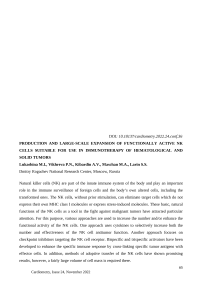Production and large-scale expansion of functionally active NK cells suitable for use in immunotherapy of hematological and solid tumors
Автор: Lukashina M.I., Vikhreva P.N., Kibardin A.V., Maschan M.A., Larin S.S.
Журнал: Cardiometry @cardiometry
Статья в выпуске: 24, 2022 года.
Бесплатный доступ
Natural killer cells (NK) are part of the innate immune system of the body and play an important role in the immune surveillance of foreign cells and the body’s own altered cells, including the transformed ones. The NK cells, without prior stimulation, can eliminate target cells which do not express their own MHC class I molecules or express stress-induced molecules. These basic, natural functions of the NK cells as a tool in the fight against malignant tumors have attracted particular attention. For this purpose, various approaches are used to increase the number and/or enhance the functional activity of the NK cells. One approach uses cytokines to selectively increase both the number and effectiveness of the NK cell antitumor function. Another approach focuses on checkpoint inhibitors targeting the NK cell receptor. Bispecific and trispecific activators have been developed to enhance the specific immune response by cross-linking specific tumor antigens with effector cells. In addition, methods of adoptive transfer of the NK cells have shown promising results, however, a fairly large volume of cell mass is required there.
Короткий адрес: https://sciup.org/148326330
IDR: 148326330 | DOI: 10.18137/cardiometry.2022.24.conf.36
Текст статьи Production and large-scale expansion of functionally active NK cells suitable for use in immunotherapy of hematological and solid tumors
Dmitry Rogachev National Research Center, Moscow, Russia
Natural killer cells (NK) are part of the innate immune system of the body and play an important role in the immune surveillance of foreign cells and the body’s own altered cells, including the transformed ones. The NK cells, without prior stimulation, can eliminate target cells which do not express their own MHC class I molecules or express stress-induced molecules. These basic, natural functions of the NK cells as a tool in the fight against malignant tumors have attracted particular attention. For this purpose, various approaches are used to increase the number and/or enhance the functional activity of the NK cells. One approach uses cytokines to selectively increase both the number and effectiveness of the NK cell antitumor function. Another approach focuses on checkpoint inhibitors targeting the NK cell receptor. Bispecific and trispecific activators have been developed to enhance the specific immune response by cross-linking specific tumor antigens with effector cells. In addition, methods of adoptive transfer of the NK cells have shown promising results, however, a fairly large volume of cell mass is required there.
Cardiometry, Issue 24, November 2022
Conference Proceedings
To solve this problem, it is necessary at the beginning to determine the source of biological material. We had peripheral blood at our disposal, and further work was carried out using various methods for isolating and expanding the NK cells: conventionally, used are isolation of the mononuclear cell fraction in the Ficoll density gradient and its variant RosetteSep and magnetic separation. The obtained cell fraction was cultured in the presence of the K562-mIL15-mIL21-41BBL feeder line for 3 weeks. As a result of the cultivation, significant amounts of the NK cells were obtained: an increase by 100,000 times from the initial number. The functional activity of the obtained cells was determined using flow cytometric analysis by changing the degranulation marker (CD107a) against the K562 cell line and fluorescent imaging in a cytotoxic test against tumor cell lines. The degranulation marker increased approximately by 1.5 times.
The cytotoxic test showed that after 2-3 days the number of tumor cells was reduced to almost zero. To assess the possibility of storing the obtained NK cells, they were subjected to cryopreservation. Their functional activity, after thawing, was tested in tests similar to testing of the freshly prepared cells. All functional characteristics of the post-thaw cells preserved.
Thus, the large-scale production technology of the NK cells makes it possible to obtain a highly purified population of the cytotoxic NK cells suitable for clinical use.


